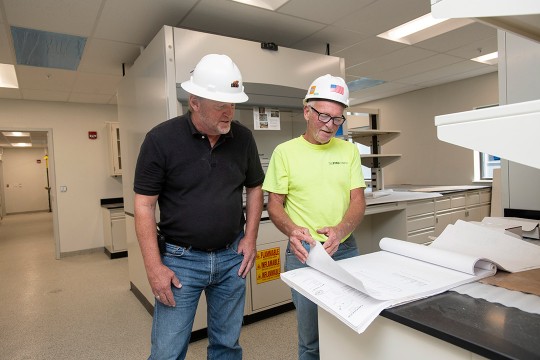Research News
- RIT/
- College of Science/
- Research/
- Research News
-
September 28, 2022
![person doing Tai Chi with a small humanoid robot.]()
Faculty researchers develop humanoid robotic system to teach Tai Chi
Zhi Zheng’s robot is skilled at Tai Chi, and her research team hopes it will soon lead a class of older adults at a local community center. Zheng, assistant professor of biomedical engineering in Kate Gleason College of Engineering, developed the humanoid robot as part of her assistive technology research.
-
September 23, 2022
![student wearing a virtual reality headset.]()
AI summit brings together an exciting range of research underway
Applications being developed at RIT using artificial intelligence vary from sophisticated medical monitoring devices to the development of autonomous systems for Indy racecars. These represent some of the exciting and complex work underway at the university that will be featured prominently at the AI@RIT Summit: Discovering and Harnessing the Breadth and Depth of Artificial Intelligence at RIT.
-
September 22, 2022
![two people in a lab wearing hard hats looking at blueprints.]()
Brown Hall renovations in final stages
The outside of RIT’s Brown Hall looks the same, but inside everything has changed. Once the final details are settled, Brown Hall will house new laboratories for genomics, computer engineering, and soil and traffic studies, as well as several computer facilities and office space.
-
September 16, 2022
![graphic with portrait of Lishibanya Mohapatra, assistant professor in the College of Science.]()
NIH funds new RIT-led study to explore how living cells regulate the growth of organelles
Lishibanya Mohapatra, an assistant professor at RIT’s School of Physics and Astronomy, hopes that a better understanding of how living cells maintain the size of their organelles can lead to therapies for neurodegenerative diseases. She earned a five-year, $1.7 million grant from the National Institutes of Health to study how cells control the size of organelles.
-
September 14, 2022
![scientists in clean suits walking around the gold, hexagonal mirrors of the James Webb Space Telescope.]()
JWST’s First Glimpses of Early Galaxies Could Break Cosmology
Scientific American talks to Jeyhan Kartaltepe, associate professor in RIT’s School of Physics and Astronomy, about what information scientists are learning from the first images from the James Webb Space Telescope.
-
September 1, 2022
![a smokestack from a building emitting exhaust.]()
Scientists find the social cost of carbon is more than triple the current federal estimate
After years of robust modeling and analysis, a multi-institutional team including researchers from RIT has released an updated social cost of carbon estimate that reflects new methodologies and key scientific advancements.
-
August 29, 2022
![side-by-side images of the Jewel Bug Nebula, with the left showing purples and blues and the right showing reds, blues, and greens.]()
RIT scientists to study molecular makeup of planetary nebulae using radio telescopes
By using radio telescopes to study sun-like stars in their death throes, scientists hope to reveal important information about the origin of life-enabling chemicals in the universe. The NSF is awarding a $339,362 grant to a team led by Professor Joel Kastner to conduct such a study.
-
August 26, 2022
![galaxies and stars in deep space.]()
Webb telescope is already challenging what astronomers thought they knew
The Washington Post talks to Jeyhan Kartaltepe, associate professor in RIT’s School of Physics and Astronomy, about the influx of data from the James Webb Space Telescope.
-
August 24, 2022
![two people using a handheld scanner on a fabric flag with a bald eagle.]()
RIT scientists develop spectral imaging techniques to help museums with conservation efforts
Scientists from RIT are turning studio photography technology on its head to help museums and other cultural heritage institutions preserve historically significant artifacts.
-
August 7, 2022
![An image of many tiny, distant galaxies taken by the James Webb Space Telescope]()
Looking back on some of the universe’s oldest galaxies with James Webb
Digital Trends discusses early data from the Cosmic Evolution Early Release Science Survey (CEERS), a project RIT Associate Professor Jeyhan Kartaltepe is co-investigator for.
-
August 5, 2022
![Student and professor in lab, looking at computer screen]()
RIT student Lazar Buntic awarded NASA FINESST graduate student fellowship
RIT student Lazar Buntic received a earned a graduate research fellowship through the Future Investigators in NASA Earth and Space Science and Technology program to develop infrared detectors for next generation telescopes.
-
August 4, 2022
![two syringes and a small glass vial of smallpox and moneypox vaccine.]()
Monkeypox vaccines: A virologist answers 6 questions about how they work, who can get them and how well they prevent infection
The Conversation asks Maureen Ferran, associate professor in the Thomas H. Gosnell School of Life Sciences, about the two vaccines that can protect against monkeypox.
















